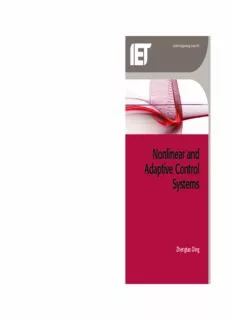Table Of ContentControl Engineering Series 84
CN
Nonlinear and Adaptive
oo Nonlinear and
nn
Control Systems tl
ri
on
le
Sa Adaptive Control
yr
sa
ten
md
Systems
An adaptive system for linear systems with unknown parameters is a Zhengtao Ding is a Senior Lecturer in Control
nonlinear system. The analysis of such adaptive systems requires similar Engineering and Director for MSc in Advanced Control sA
techniques to analyse nonlinear systems. Therefore it is natural to treat and Systems Engineering at the Control Systems d
adaptive control as a part of nonlinear control systems. Centre, School of Electrical and Electronic Engineering, a
The University of Manchester, UK. His research interests p
Nonlinear and Adaptive Control Systems treats nonlinear control focus on nonlinear and adaptive control design. He t
and adaptive control in a unified framework, presenting the major pioneered research in asymptotic rejection of general iv
results at a moderate mathematical level, suitable for MSc students periodic disturbances in nonlinear systems and e
and engineers with undergraduate degrees. Topics covered include produced a series of results to systematically solve this
introduction to nonlinear systems; state space models; describing problem in various situations. He also made significant
contributions in output regulation and adaptive control
functions for common nonlinear components; stability theory; feedback
of nonlinear systems with some more recent results on
linearization; adaptive control; nonlinear observer design; backstepping
observer design and output feedback control as well.
design; disturbance rejection and output regulation; and control Dr Ding has been teaching ‘Nonlinear and Adaptive
applications, including harmonic estimation and rejection in power Control Systems’ to MSc students for 9 years, and he
distribution systems, observer and control design for circadian rhythms, has accumulated tremendous experiences in explaining
and discrete-time implementation of continuous-time nonlinear control difficult control concepts to students.
laws.
D
Zhengtao Ding
in
g
The Institution of Engineering and Technology
www.theiet.org
978-1-84919-574-4
Nonlinear and Adaptive Control.indd 1 04/03/2013 09:32:20
IETCONTROLENGINEERINGSERIES84
Nonlinear and
Adaptive Control
Systems
Othervolumesinthisseries:
Volume8 Ahistoryofcontrolengineering,1800–1930S.Bennett
Volume18 Appliedcontroltheory,2ndEditionJ.R.Leigh
Volume20 DesignofmoderncontrolsystemsD.J.Bell,P.A.CookandN.Munro(Editors)
Volume28 RobotsandautomatedmanufactureJ.Billingsley(Editor)
Volume33 TemperaturemeasurementandcontrolJ.R.Leigh
Volume34 SingularperturbationmethodologyincontrolsystemsD.S.Naidu
Volume35 Implementationofself-tuningcontrollersK.Warwick(Editor)
Volume37 Industrialdigitalcontrolsystems,2ndEditionK.WarwickandD.Rees(Editors)
Volume39 ContinuoustimecontrollerdesignR.Balasubramanian
Volume40 DeterministiccontrolofuncertainsystemsA.S.I.Zinober(Editor)
Volume41 Computercontrolofreal-timeprocessesS.BennettandG.S.Virk(Editors)
Volume42 DigitalsignalProcessing:principles,devicesandapplicationsN.B.Jonesand
J.D.McK.Watson(Editors)
Volume44 Knowledge-basedsystemsforindustrialcontrolJ.McGhee,M.J.GrimbleandA.Mowforth
(Editors)
Volume47 AHistoryofcontrolengineering,1930–1956S.Bennett
Volume49 PolynomialmethodsinoptimalcontrolandfilteringK.J.Hunt(Editor)
Volume50 ProgrammingindustrialcontrolsystemsusingIEC1131-3R.W.Lewis
Volume51 AdvancedroboticsandintelligentmachinesJ.O.GrayandD.G.Caldwell(Editors)
Volume52 AdaptivepredictionandpredictivecontrolP.P.Kanjilal
Volume53 NeuralnetworkapplicationsincontrolG.W.Irwin,K.WarwickandK.J.Hunt(Editors)
Volume54 Controlengineeringsolutions:apracticalapproachP.Albertos,R.StrietzelandN.Mort
(Editors)
Volume55 GeneticalgorithmsinengineeringsystemsA.M.S.ZalzalaandP.J.Fleming(Editors)
Volume56 SymbolicmethodsincontrolsystemanalysisanddesignN.Munro(Editor)
Volume57 FlightcontrolsystemsR.W.Pratt(Editor)
Volume58 Power-plantcontrolandinstrumentation:thecontrolofboilersandHRSGsystems
D.Lindsley
Volume59 ModellingcontrolsystemsusingIEC61499R.Lewis
Volume60 Peopleincontrol:humanfactorsincontrolroomdesignJ.NoyesandM.Bransby(Editors)
Volume61 Nonlinearpredictivecontrol:theoryandpracticeB.KouvaritakisandM.Cannon(Editors)
Volume62 ActivesoundandvibrationcontrolM.O.TokhiandS.M.Veres
Volume63 Steppingmotors,4theditionP.P.Acarnley
Volume64 Controltheory,2ndEditionJ.R.Leigh
Volume65 ModellingandparameterestimationofdynamicsystemsJ.R.Raol,G.GirijaandJ.Singh
Volume66 Variablestructuresystems:fromprinciplestoimplementationA.Sabanovic,L.Fridman
andS.Spurgeon(Editors)
Volume67 Motionvision:designofcompactmotionsensingsolutionforautonomoussystems
J.KolodkoandL.Vlacic
Volume68 Flexiblerobotmanipulators:modelling,simulationandcontrolM.O.Tokhiand
A.K.M.Azad(Editors)
Volume69 AdvancesinunmannedmarinevehiclesG.RobertsandR.Sutton
(Editors)
Volume70 IntelligentcontrolsystemsusingcomputationalintelligencetechniquesA.Ruano
(Editor)
Volume71 AdvancesincognitivesystemsS.NeftiandJ.Gray(Editors)
Volume72 Controltheory:aguidedtour,3rdEditionJ.R.Leigh
Volume73 AdaptivesamplingwithMobileWSNK.Sreenath,M.F.Mysorewala,D.O.Popa
andF.L.Lewis
Volume74 Eigenstructurecontrolalgorithms:applicationstoaircraft/rotorcrafthandling
qualitiesdesignS.Srinathkumar
Volume75 AdvancedcontrolforconstrainedprocessesandsystemsF.Garelli,R.J.Mantzand
H.DeBattista
Volume76 DevelopmentsincontroltheorytowardsglocalcontrolL.Qiu,J.Chen,T.Iwasakiand
H.Fujioka
Volume77 FurtheradvancesinunmannedmarinevehiclesG.N.RobertsandR.Sutton(Editors)
Volume78 Frequency-domaincontroldesignforhigh-performancesystemsJ.O’Brien
Nonlinear and
Adaptive Control
Systems
Zhengtao Ding
TheInstitutionofEngineeringandTechnology
PublishedbyTheInstitutionofEngineeringandTechnology,London,UnitedKingdom
TheInstitutionofEngineeringandTechnologyisregisteredasaCharityinEngland&
Wales(no.211014)andScotland(no.SC038698).
©2013TheInstitutionofEngineeringandTechnology
Firstpublished2013
ThispublicationiscopyrightundertheBerneConventionandtheUniversalCopyright
Convention.Allrightsreserved.Apartfromanyfairdealingforthepurposesofresearchor
privatestudy,orcriticismorreview,aspermittedundertheCopyright,DesignsandPatentsAct
1988,thispublicationmaybereproduced,storedortransmitted,inanyformorbyanymeans,
onlywiththepriorpermissioninwritingofthepublishers,orinthecaseofreprographic
reproductioninaccordancewiththetermsoflicencesissuedbytheCopyrightLicensing
Agency.Enquiriesconcerningreproductionoutsidethosetermsshouldbesenttothe
publisherattheundermentionedaddress:
TheInstitutionofEngineeringandTechnology
MichaelFaradayHouse
SixHillsWay,Stevenage
Herts,SG12AY,UnitedKingdom
www.theiet.org
Whiletheauthorandpublisherbelievethattheinformationandguidancegivenin
thisworkarecorrect,allpartiesmustrelyupontheirownskillandjudgementwhen
makinguseofthem.Neithertheauthornorthepublisherassumesanyliabilityto
anyoneforanylossordamagecausedbyanyerrororomissioninthework,whether
suchanerrororomissionistheresultofnegligenceoranyothercause.Anyandall
suchliabilityisdisclaimed.
Themoralrightsoftheauthortobeidentifiedasauthorofthisworkhavebeen
assertedbyhiminaccordancewiththeCopyright,DesignsandPatentsAct1988.
BritishLibraryCataloguinginPublicationData
AcataloguerecordforthisproductisavailablefromtheBritishLibrary
ISBN978-1-84919-574-4(hardback)
ISBN978-1-84919-575-1(PDF)
TypesetinIndiabyMPSLimited
PrintedintheUKbyCPIGroup(UK)Ltd,Croydon
Tomyfamily,Yinghong,GuangyueandXiang
Contents
Preface ix
1 Introductiontononlinearandadaptivesystems 1
1.1 Nonlinearfunctionsandnonlinearities 1
1.2 Commonnonlinearsystemsbehaviours 4
1.3 Stabilityandcontrolofnonlinearsystems 5
2 Statespacemodels 9
2.1 Nonlinearsystemsandlinearisationaroundanoperatingpoint 9
2.2 Autonomoussystems 11
2.3 Second-ordernonlinearsystembehaviours 12
2.4 Limitcyclesandstrangeattractors 18
3 Describingfunctions 25
3.1 Fundamentals 26
3.2 Describingfunctionsforcommonnonlinearcomponents 29
3.3 Describingfunctionanalysisofnonlinearsystems 34
4 Stabilitytheory 41
4.1 Basicdefinitions 41
4.2 Linearisationandlocalstability 45
4.3 Lyapunov’sdirectmethod 46
4.4 Lyapunovanalysisoflineartime-invariantsystems 51
5 Advancedstabilitytheory 55
5.1 Positiverealsystems 55
5.2 Absolutestabilityandcirclecriterion 59
5.3 Input-to-statestabilityandsmallgaintheorem 65
5.4 Differentialstability 71
6 Feedbacklinearisation 75
6.1 Input–outputlinearisation 75
6.2 Full-statefeedbacklinearisation 83
7 Adaptivecontroloflinearsystems 89
7.1 MRACoffirst-ordersystems 90
7.2 Modelreferencecontrol 94
7.3 MRACoflinearsystemswithrelativedegree1 99
7.4 MRACoflinearsystemswithhighrelatives 102
7.5 Robustadaptivecontrol 103
viii Nonlinearandadaptivecontrolsystems
8 Nonlinearobserverdesign 109
8.1 Observerdesignforlinearsystems 109
8.2 Linearobservererrordynamicswithoutputinjection 111
8.3 Linearobservererrordynamicsviadirectstatetransformation 120
8.4 ObserverdesignforLipschitznonlinearsystems 122
8.5 Reduced-orderobserverdesign 127
8.6 Adaptiveobserverdesign 136
9 Backsteppingdesign 141
9.1 Integratorbackstepping 141
9.2 Iterativebackstepping 144
9.3 Observerbackstepping 147
9.4 Backsteppingwithfilteredtransformation 152
9.5 Adaptivebackstepping 159
9.6 Adaptiveobserverbackstepping 167
10 Disturbancerejectionandoutputregulation 175
10.1 Asymptoticrejectionofsinusoidaldisturbances 175
10.2 Adaptiveoutputregulation 186
10.3 Outputregulationwithnonlinearexosystems 194
10.4 Asymptoticrejectionofgeneralperiodicdisturbances 204
11 Controlapplications 219
11.1 Harmonicsestimationandrejectioninpowerdistribution
systems 219
11.1.1 Systemmodel 220
11.1.2 Iterativeobserverdesignforestimatingfrequency
modesininput 224
11.1.3 Estimationofspecificfrequencymodesininput 232
11.1.4 Rejectionoffrequencymodes 234
11.1.5 Example 235
11.2 Observerandcontroldesignforcircadianrhythms 238
11.2.1 Circadianmodel 239
11.2.2 Lipschitzobserverdesign 241
11.2.3 Phasecontrolofcircadianrhythms 243
11.3 Sampled-datacontrolofnonlinearsystems 247
11.3.1 Systemmodelandsampled-datacontrol 249
11.3.2 Stabilityanalysisofsampled-datasystems 251
11.3.3 Simulation 260
BibliographicalNotes 263
References 268
Index 275
Preface
This book is intended for the use as a textbook at MSc and senior undergraduate
level in control engineering and related disciplines such as electrical, mechanical,
chemicalandaerospaceengineeringandappliedmathematics.Itcanalsobeusedas
areferencebookbycontrolengineersinindustryandresearchstudentsinautomation
andcontrol. Itislargely, althoughnotentirely, basedonthecourseunitbearingthe
samenameasthebooktitlethatIhavebeenteachingforseveralyearsfortheMSc
courseatControlSystemsCentre,SchoolofElectricalandElectronicEngineering,
TheUniversityofManchester.Thebeginningchapterscoverfundamentalconcepts
innonlinearcontrolatmoderatemathematicallevelsuitableforstudentswithafirst
degree in engineering disciplines. Simple examples are used to illustrate important
concepts,suchasthedifferencebetweenexponentialstabilityandasymptoticstability.
Someadvancedandrecentstabilityconceptssuchasinput-to-statestabilityarealso
included,mainlyasanintroductionataless-demandingmathematicallevelcompared
with their normal descriptions in the existing books, to research students who may
encounterthoseconceptsinliterature.Mostofthetheoremsinthebeginningchapters
are introduced with the proofs, and some of the theorems are simplified with less
general scopes, but without loss of rigour. The later chapters cover several topics
which are closely related to my own research activities, such as nonlinear observer
designandasymptoticdisturbancerejectionofnonlinearsystems.Theyareincluded
to demonstrate the applications of fundamental concepts in nonlinear and adaptive
controltoMScandresearchstudents,andtobridgethegapbetweenanormaltextbook
treatment of control concepts and that of research articles published in academic
journals. They can also be used as references for the students who are working on
therelatedtopics.Attheendofthebook,applicationstolesstraditionalareassuch
ascontrolofcircadianrhythmsarealsoshown,toencouragereaderstoexplorenew
appliedareasofnonlinearandadaptivecontrol.
This book aims at a unified treatment of adaptive and nonlinear control.
Itiswellknownthatthedynamicsofanadaptivecontrolsystemforalineardynamic
system with unknown parameters are nonlinear.The analysis of such adaptive sys-
tems requires similar techniques to the analysis for nonlinear systems. Some more
recentcontroldesigntechniquessuchasbacksteppingreliesonLyapunovfunctions
toestablishthestability,andtheycanbedirectlyextendedtoadaptivecontrolofnon-
linearsystems.Thesetechniquesfurtherreducethetraditionalgapbetweenadaptive
control and nonlinear control. Therefore, it is now natural to treat adaptive control
as a part of nonlinear control systems. The foundation for linear adaptive control
andnonlinearadaptivecontrolisthepositivereallemma,whichisrelatedtopassive
systemsinnonlinearcontrolandLyapunovanalysis.Itisdecidedtousethepositive
Description:An adaptive system for linear systems with unknown parameters is a nonlinear system. The analysis of such adaptive systems requires similar techniques to analysis for nonlinear systems. Therefore it is natural to treat adaptive control as a part of nonlinear control systems. Nonlinear and Adaptive C

